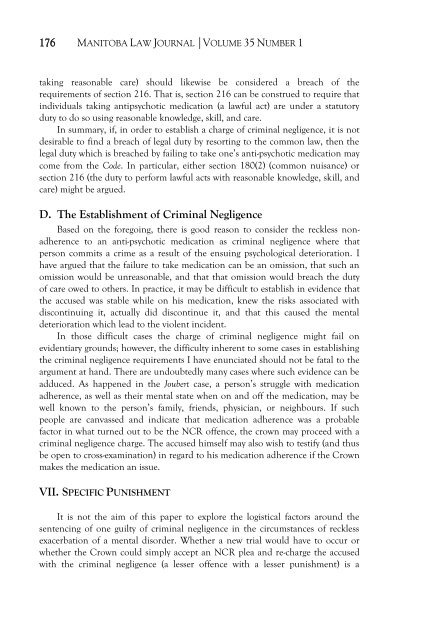Download PDF - Robson Hall Faculty of Law
Download PDF - Robson Hall Faculty of Law
Download PDF - Robson Hall Faculty of Law
Create successful ePaper yourself
Turn your PDF publications into a flip-book with our unique Google optimized e-Paper software.
176 MANITOBA LAW JOURNAL |VOLUME 35 NUMBER 1<br />
taking reasonable care) should likewise be considered a breach <strong>of</strong> the<br />
requirements <strong>of</strong> section 216. That is, section 216 can be construed to require that<br />
individuals taking antipsychotic medication (a lawful act) are under a statutory<br />
duty to do so using reasonable knowledge, skill, and care.<br />
In summary, if, in order to establish a charge <strong>of</strong> criminal negligence, it is not<br />
desirable to find a breach <strong>of</strong> legal duty by resorting to the common law, then the<br />
legal duty which is breached by failing to take one’s anti-psychotic medication may<br />
come from the Code. In particular, either section 180(2) (common nuisance) or<br />
section 216 (the duty to perform lawful acts with reasonable knowledge, skill, and<br />
care) might be argued.<br />
D. The Establishment <strong>of</strong> Criminal Negligence<br />
Based on the foregoing, there is good reason to consider the reckless nonadherence<br />
to an anti-psychotic medication as criminal negligence where that<br />
person commits a crime as a result <strong>of</strong> the ensuing psychological deterioration. I<br />
have argued that the failure to take medication can be an omission, that such an<br />
omission would be unreasonable, and that that omission would breach the duty<br />
<strong>of</strong> care owed to others. In practice, it may be difficult to establish in evidence that<br />
the accused was stable while on his medication, knew the risks associated with<br />
discontinuing it, actually did discontinue it, and that this caused the mental<br />
deterioration which lead to the violent incident.<br />
In those difficult cases the charge <strong>of</strong> criminal negligence might fail on<br />
evidentiary grounds; however, the difficulty inherent to some cases in establishing<br />
the criminal negligence requirements I have enunciated should not be fatal to the<br />
argument at hand. There are undoubtedly many cases where such evidence can be<br />
adduced. As happened in the Joubert case, a person’s struggle with medication<br />
adherence, as well as their mental state when on and <strong>of</strong>f the medication, may be<br />
well known to the person’s family, friends, physician, or neighbours. If such<br />
people are canvassed and indicate that medication adherence was a probable<br />
factor in what turned out to be the NCR <strong>of</strong>fence, the crown may proceed with a<br />
criminal negligence charge. The accused himself may also wish to testify (and thus<br />
be open to cross-examination) in regard to his medication adherence if the Crown<br />
makes the medication an issue.<br />
VII.<br />
SPECIFIC PUNISHMENT<br />
It is not the aim <strong>of</strong> this paper to explore the logistical factors around the<br />
sentencing <strong>of</strong> one guilty <strong>of</strong> criminal negligence in the circumstances <strong>of</strong> reckless<br />
exacerbation <strong>of</strong> a mental disorder. Whether a new trial would have to occur or<br />
whether the Crown could simply accept an NCR plea and re-charge the accused<br />
with the criminal negligence (a lesser <strong>of</strong>fence with a lesser punishment) is a














